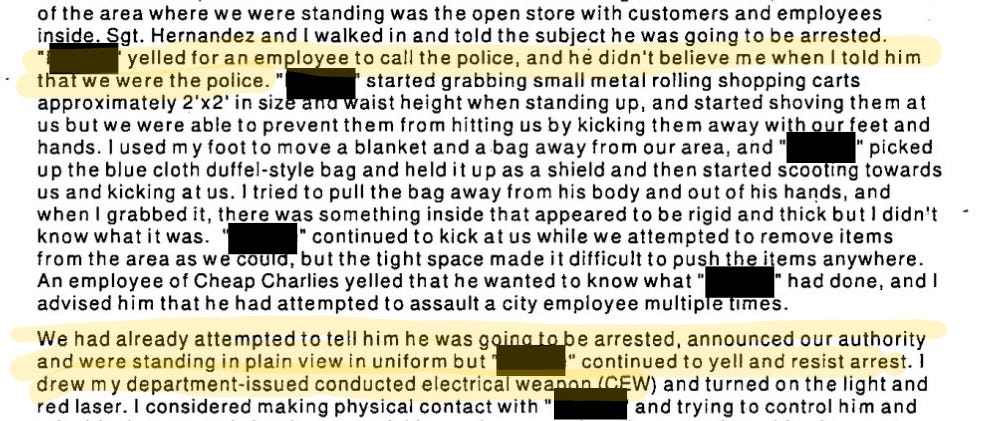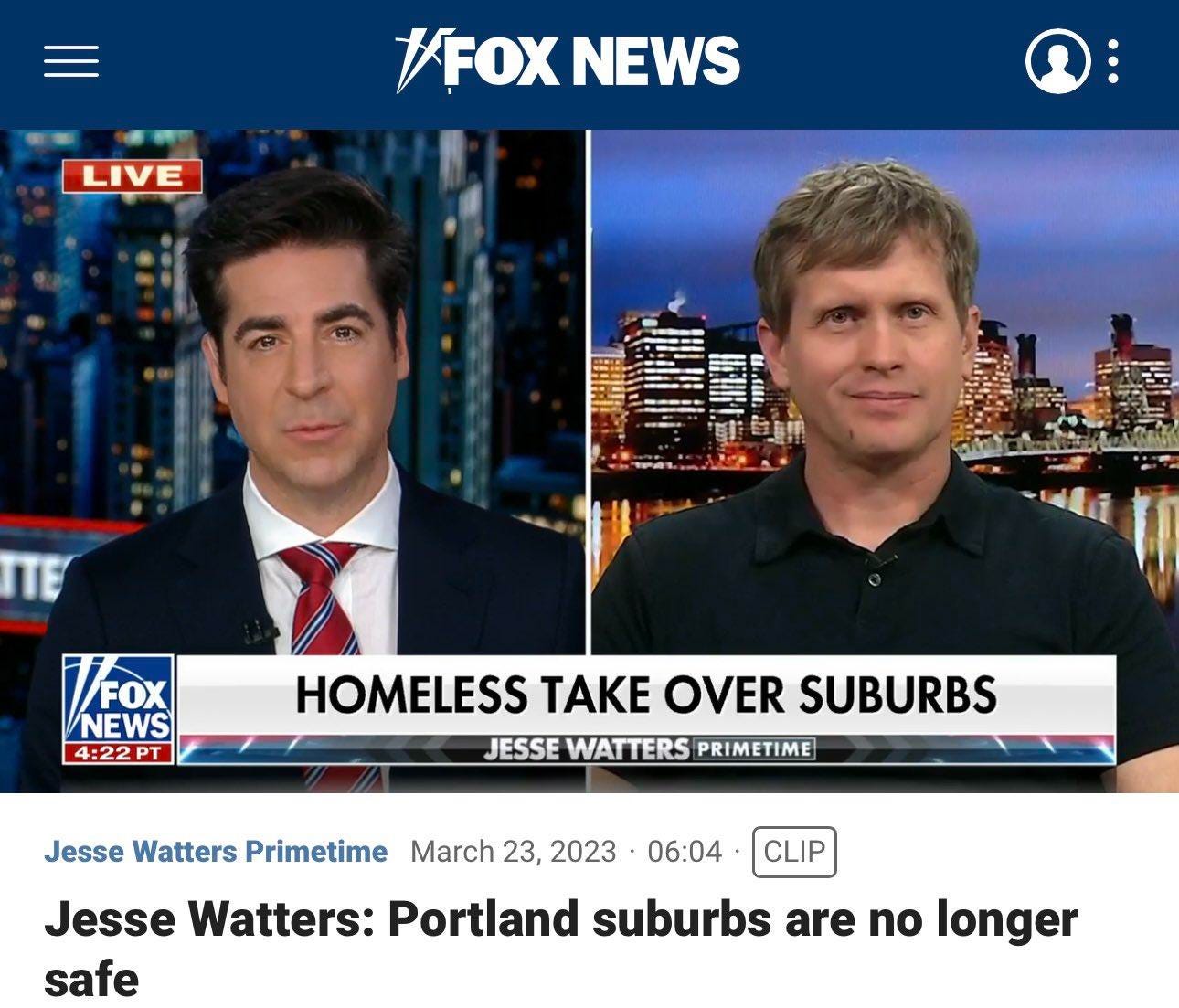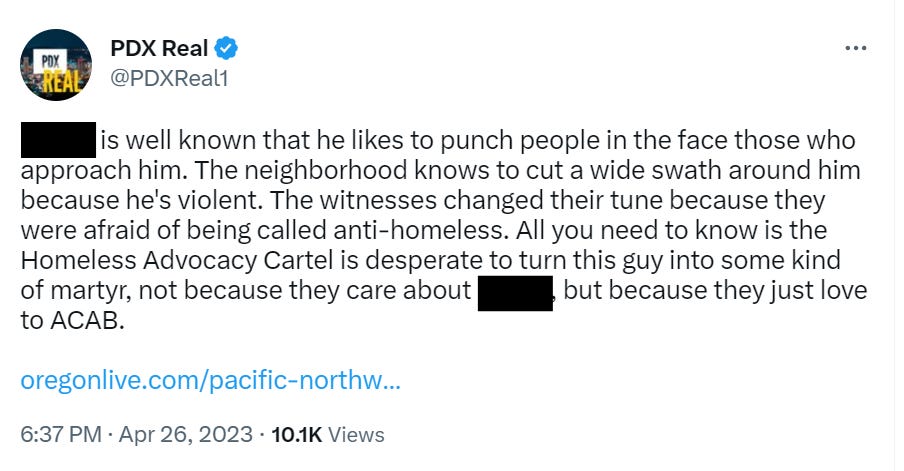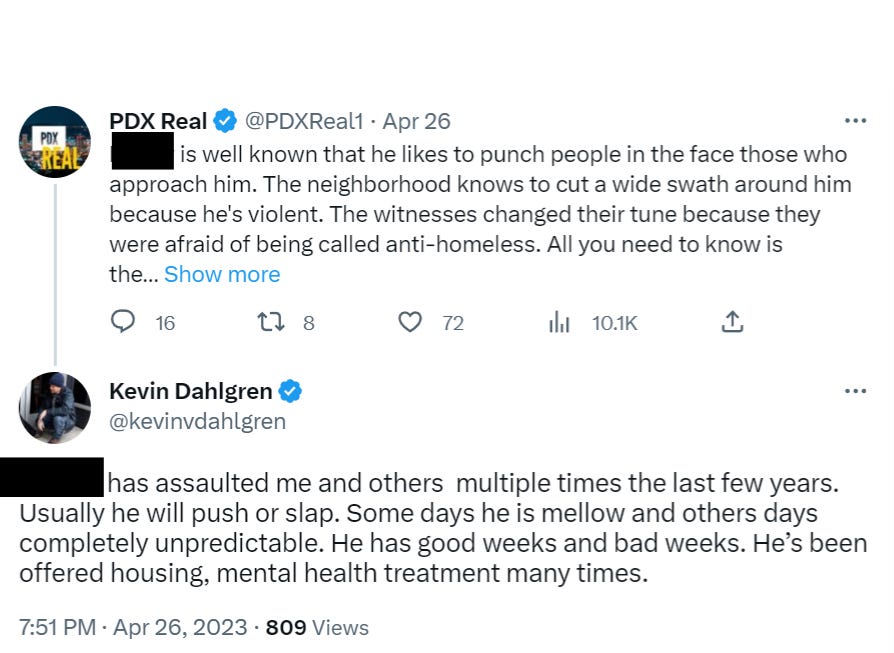“They kept telling us to leave him alone and just let him go”
Police reports reveal details of false assault claims and police violence in Gresham
As first reported in this article from Oregon Live, multiple witnesses claim an employee of Gresham’s homeless outreach team lied to the police about being assaulted by an unhoused Gresham resident who has deep ties to a number of local business owners. We are omitting his name out of respect and redacting it where it appears in public records we have received.
The resident was confronted while on the back stairs of a business whose owner has given him long-standing permission to sleep there. According to one witness, the worker used the police as a threat when he refused to leave the stairs, saying “Okay, if you don’t get going, I'm going to call the cops, and I'm gonna tell them that you assaulted me."
When police responded to the call, they tased the man multiple times, knelt on his body, and stepped on his ankle. He was unarmed and seated on the floor when he was assaulted by the police, holding a bag in front of his body to protect himself. Gresham police charged him with fourth-degree assault, resisting arrest, and harassment before taking him to the hospital on a gurney.
We’ve learned that these charges were dropped by the Multnomah County District Attorney’s office. We have also received the police reports from the incident, which reveal that the worker who made the false claim of assault has made frequent calls directly to one of the officers involved while on the job:
Given the behavior of both men in this incident, their frequent collaboration is concerning. But beyond the behavior of one outreach worker, we also want to call attention to the larger issue at hand: weaponizing “outreach” and so-called “compassion” against homeless people.
No Compassion in Sweeps
This abusive event was set in motion by Gresham’s policy towards homelessness, which includes a total ban on camping. The city calls its approach “firm compassion.” As The Outlook notes in their follow-up reporting on the incident, in practice this often means displacement, and many who are pushed out of Gresham “make their way to the Portland city limits.” The police report reveals this policy of displacement in action:
Someone saw a man in a sleeping bag, in an area where he is well known and welcomed. After a series of calls between city employees to relay the complaint, an outreach worker was ordered to “go move that person along.” The owner confirmed that the man had permission to sleep there, and the outreach worker claimed this didn’t matter due to city code. The police were then used as a threat to get the man to move – not to any particular place, but simply “out of sight.” Even before the false accusation of assault and police misuse of force, Gresham’s criminalization of poverty led to unnecessary harassment of a community member. Pushing people out of sight and away from their support network is not compassionate.
No Safety In Criminalization
Despite the presence of multiple witnesses who could have offered important information contradicting the outreach worker's claims, police asked no questions and immediately moved to arrest the resident.
Moreover, the officers’ statements reveal they were aware that the resident was confused and unable to process the orders he was given, and that he did not believe the men threatening to arrest him were police. Despite this, the officers used his failure to comply with their orders as evidence of resisting arrest and as justification for the use of force:
This common and dangerous dynamic, in which non-compliance is used as justification of force regardless of cognitive capacity, puts individuals with disabilities at greater risk of police violence.
One officer further justified their escalation of the situation by claiming the man was a threat to the individuals witnessing the scene – but another officer’s report admitted that those individuals actively called for them to stop their abuse:
The power dynamics are clear: the word of a city employee was taken as truth without question, and an unhoused individual was assumed guilty. No attempts at de-escalation were made. This is a common story, but most arrests aren't caught on the camera of a supportive friend's business.
Throughout, no one but the outreach worker and the police believed any intervention was needed. No one present confirmed the outreach worker's story or expressed support for the use of force. Criminalization of homelessness is often framed as a matter of public safety – in practice, it introduces unnecessary violence.
Despite the evidence, the city has so far supported the conduct of the outreach worker and the police. In a public statement, a Gresham spokesperson told the public not to believe their eyes: "The Police Officers made every attempt to reason with the individual and de-escalate the situation; however, his aggressive behavior continued as he assaulted the Police Officers." Anyone who has watched the video can understand the absurdity of this claim. Gresham police likewise say the officers involved violated no laws or policies.
No Honesty in Gresham?
Unfortunately, the issues extend beyond harmful policy. The outreach worker’s behavior seems to fit what we know of the culture established by Gresham's homeless services team. Kevin Dahlgren, the team’s most publicly visible and politically active leader, frequently posts pictures and videos on social media of houseless individuals in vulnerable moments, revealing their names and locations in the process. He uses these videos to advocate both locally and nationally for policies of forced treatment and criminalization – again framing these as compassionate interventions.
Rather than express concern regarding the conduct of his colleague, Mr. Dahlgren has chosen to use his substantial public following to further attack the unhoused resident who was targeted in the incident – and to tacitly support outright lies directed at the Gresham business owners who witnessed the event:
PDX Real, an account that claims to practice independent journalism, released a tweet stating that this resident is well-known for punching people in the face; that his reputation is so widespread that people know “to cut a wide swath around him;” and that the witnesses “changed their tune because they were afraid of being called anti-homeless.”
These are fabrications. There was no public pressure prior to OregonLive’s report, as there was no public knowledge of the event. The incident only reached the press because the owner of the store where it took place decided to take action. Moreover, the police reports reveal that witness testimony at the time of the event is consistent with the reporting that followed. Each witness interviewed expressed support for the unhoused resident, affirmed his long-term good standing in the community, and voiced either skepticism or outright denial of the claims of assault:
We could dismiss these fabrications as nonsense from an account unrelated to the incident – except that Mr. Dahlgren himself responded with affirmation, claiming that this man “has assaulted me and others multiple times over the last few years.” This statement also seems to be contradicted by the police report.
Discussing the alleged assault, the outreach worker tells an officer that he knew who the individual in question would be as soon as he got the call from his boss, as this was “‘his area’ where he hangs out all day every day.” Moreover, he claimed that he had worked with the unhoused resident for five years, and throughout that time he had never witnessed or expected any violence from him.
It is unlikely that a man with a well-known reputation for physical assault and “completely unpredictable” behavior would have the long-term trust, care, and support of the business owners who see him on a daily basis. It is even less likely that the outreach worker could be completely unaware of this reputation after five years of interactions with the individual.
Mr. Dahlgren’s story could only be true if he never passed along knowledge of the multiple assaults he and others allegedly experienced to his colleagues on the Homeless Services team. Failure to do so would be both strange and highly unprofessional, as it could endanger his colleagues in their work. In most social services settings, this failure would be grounds for termination.
In addition, OregonLive reports that the individual in question has no prior record of arrests for assault. Taken together, the evidence suggests that Mr. Dahlgren has decided to smear the name of a vulnerable community member in order to protect the public image of his team. This would be reprehensible by itself. His decision to simultaneously amplify easily disproven lies spread by another account – lies that accuse Gresham business owners of changing their testimony to intentionally mislead the press – is especially troubling.
A Bigger Issue
What happened in Gresham, as well as the disappointing response of the police, public officials, and leadership of the Homeless Services Team to date, open a number of questions. In particular, we are left wondering how many other unhoused individuals have faced similar threats, false accusations, unnecessary arrests, and police violence as a result of the Gresham’s Homeless Services team’s “firm compassion.” As Gresham city councilor Vince Jones-Dixon stated in OregonLive’s initial report on the incident, “I think we have a bigger issue in the county around services we provide and evaluating whether the services are helping.”
That bigger issue includes the portrayal of homelessness as a “Portland problem,” distinct from conditions in the surrounding suburbs and the nation as a whole. A systematic policy of displacement in places such as Gresham does not end homelessness – instead, it seeks to disappear it. The individuals impacted are often forced into less safe situations with fewer supports, losing essential belongings and community connections along the way. As Portland and the surrounding metro area ramp up sweeps and push hard to hyper-enforce camping bans, living options shrink and the daily violence inflicted on unhoused residents increases.
We hope the public and the press will continue to pressure Gresham officials to act with accountability. And in a moment when anti-homeless rhetoric is gaining traction, we hope this incident reveals the danger of Gresham's decision to meet a housing crisis with criminalization, displacement, and increased policing.
















